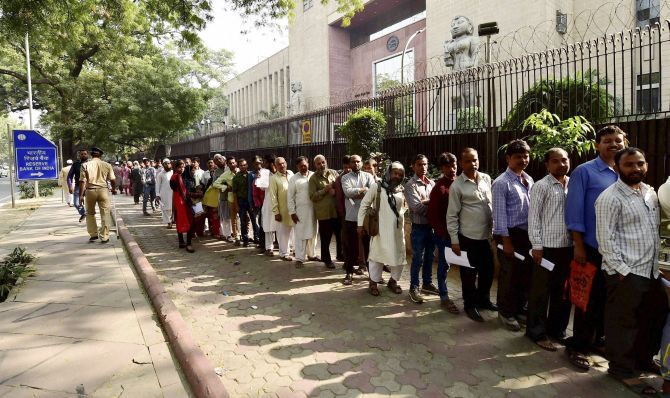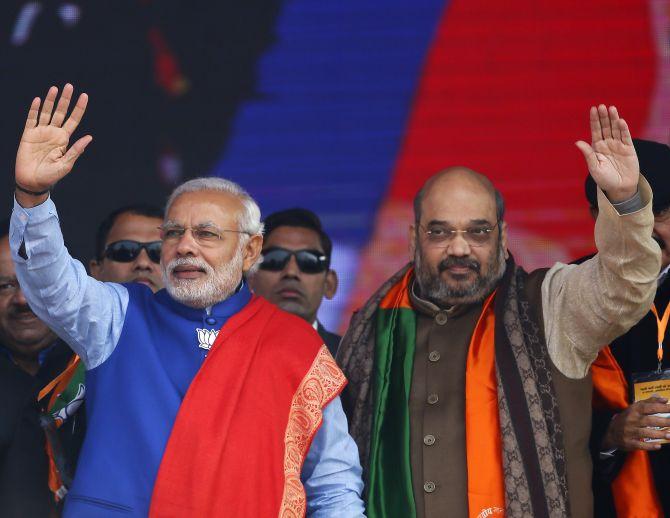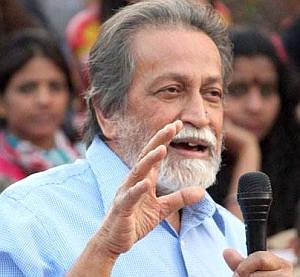'Even with the restrictions of depositing more than Rs 2.5 lakh in a bank, people will find new methods to convert this cash hoard into legal tender.'

Prabhat Patnaik, Professor Emeritus, Centre for Economic Studies and Planning School of Social Sciences, Jawaharlal Nehru University, rubbished the economic logic of demonetising Rs 500 and Rs 1,000 notes to curb the black economy.
Professor Patnaik tells Rediff.com's Prasanna D Zore that this move could backfire politically on the Narendra Modi government, especially in the agrarian states of Punjab and Uttar Pradesh that are going to the polls next year.
How do you explain to a layperson what black money is, how is it created, and what are the incentives for its generation and circulation?
Black money does not only point to a hoarding of money. It relates to business activities which are carried out either illegally, like drug running, procuring arms for terrorist groups, or alternatively, they are normal activities like from a mine, ore is extracted but only a part of it is actually declared and the rest goes unaccounted to avoid paying tax on it.
The incentive in the latter example is avoidance of taxes and in the former, to benefit from an illegal activity that harms the nation.
So, black money really refers to a whole set of activities, which are carried out in the economy, but which are not declared to be such.
Is buying and selling of homes when buyers pay a cash component, apart from the cheque amount which is mentioned in the agreement or sale deed, also lead to generation of black money?
Exactly! In fact, it is not only while buying/selling houses, but actually when you buy something from a shop and a bill is not produced for this transaction, that also generates black money or unaccounted income, in the economy.
So, most black money is generated when we avoid payment of sales tax or stamp duty and registration on the amount at which a deal is signed or while evading income tax, and once you have some transactions that evade taxes, those transactions are to be kept secret and those transactions that are done with the proceeds of such undeclared transactions also have to be kept secret and so on.
Apart from some of the activities like drug running, arms smuggling or funding terrorist activities, the incentives to undertake such activities or avoid taxes, is for making high profits and when you evade taxes you make extra (money).
Will demonetisation of Rs 500 and Rs 1,000 notes help purge the black money that is in hard cash. I am not talking here about cash that is laundered into gold, real estate or siphoned off to tax havens abroad.
This is again the misunderstanding (that demonetisation will help unearth black/unaccounted income) behind the government's move.
Black money is not just held as a stock because black money is immediately put into some (economic) activities, like in any business, people will always have some cash in hand and the rest in some other store of value.
Likewise, in black business there would be certain amount of money (hard cash) that would be held.
Black business does not mean that only money is held. That's a mistake.
Consequently, when you say a parallel economy there is a whole lot of activities that are undeclared and thus keep multiplying this unaccounted income.
'That's the kind of situation today.'
My question is specific to black money that is hoarded as a stash of Rs 500 and Rs 1,000 notes.
During elections, it is this hard cash that is used to buy votes, buy liquor or entice voters.
Lot of hard cash worth hundreds and thousands of crores -- though this is a guesstimate and I really do not know how much hard cash moves during elections -- moves around before and during elections.
Will not these stashes of cash be purged by demonetisation?
You assumption is fair enough, but the point is normal black business is not just holding cash.
If you just say we demonetise Rs 500 and Rs 1,000 notes, then effectively you are demonetising all cash holding, whether black or white.
There is no reason to believe that this move will affect black money per se.
Suppose if I have black money or unaccounted income of Rs 2 crore, all in Rs 500 and Rs 1,000 denominations, then can I convert this now?
Every deposit above Rs 2.5 lakh will raise eyebrows or be flagged as suspicious activities by banks.
This is how capitalism works.
Typically, then what would happen, and this is what is happening on the ground post the November 8 announcement, all kinds of new businesses would come up that would actually say that you give us your Rs 1,000 note and we will give you Rs 700 in exchange for that.
And we shall actually make sure that we get the (black) money into the bank.
In other words, converting the demonetised cash in excess of Rs 2.5 lakh will itself become a business.
As a result it would lead to transfer of some money from those who are currently holding it in some unaccounted way into something else by some people, who would also be doing black business.
Would have you any official figure or a rough estimate of the actual amount of black money in Rs 500 and Rs 1,000 notes?
That is a question to which there is no answer.
It is a parallel economy. But we can say it is roughly about 20 to 25 per cent of the normal economy.
Is there any economic logic behind demonetising Rs 500 and Rs 1,000 notes first and then re-introducing new notes of Rs 500 and Rs 2,000 in the system?
It is extremely silly to my mind because, Rs 500 and Rs 1,000 notes, in value terms, represent roughly about 86 per cent of the total currency in circulation prior to this scrapping.
You are suddenly demonetising 86 per cent of the currency in circulation with no new currency to take its place.
This is fantastic, incredible.
But the banks have started exchanging the older notes with newer notes of Rs 2,000 and other denomination notes that are still legal tender?
Look at the queues outside banks and they are not even freely exchanging the older notes.
The point is the queues are so large that it takes a person about four hours to exchange these notes. That's happening outside every bank.
ATMs are not giving any money. You have to fill up a lot of forms, your ID proof, etc, and as a result ordinary people are in great difficulty.
You can't buy vegetables, groceries, food... I met somebody who said I have Rs 1,000 in my pocket, but I haven't eaten since yesterday. That's the kind of situation today.
If you are demonetising currency, it is essential then immediately you should be ready with substitute currency. That the government has not done.
Farmers and peasants have now harvested their crops and are in the process of selling it. But if nobody comes to buy these crops because there is not much legal tender circulating in the economy the crops might actually rot, creating a lot of resentment and hardships among farmers.

What was the experience when the British government banned high denomination notes in 1946 and much later under Prime Minister Morarji Desai in 1978?
Did it have any impact on the creation and flow of black money?
Nobody can say that after 1978 there was a big setback (for creation and circulation) for black money. But the Moraraji Desai demonetisation did not hurt ordinary people because in those days ordinary people didn't even see Rs 1,000, Rs 5,000 or Rs 10,000 notes.
While it did not hurt ordinary Indians, the demonetisation of 1978 did not stem the generation or flow of black money.
Even today, demonetisation will not impact black money but it has led to so many hardships for ordinary Indians.
Are you saying this move will not at all affect black money hoarders?
You need to think of black money as an activity in which you are holding some cash.
Let us assume, 10 to 20 per cent of that cash (black money) loses its value, but the activity continues.
After all, just let us say if a factory gets damaged, does it mean industrial activity will stop?
As long as any activity, be it generation of black money in the economy, is profitable, it will continue.
So, the fact that you have a once-for-all blow, assuming there will be a blow, on black money, it is not going to stop that activity and that is exactly what happened during Morarji Desai's time.
Black money generation did not stop (after 1978) by demonetising high value currency.
How much of the 86 per cent of Rs 500 and Rs 1,000 notes in circulation today will get purged because of this demonetisation?
Why will black money get purged?
Even with the restrictions of depositing more than Rs 2.5 lakh in a bank, people will find new methods to convert this cash hoard into legal tender.
You are a businessman, you want to make profits, and there is no reason for you to be sitting tight on such pile of notes, if you have one.
You'd rather use all kinds of means to convert it into legal tender.
So, are you arguing that people with such obscene amounts of hard cash would have already found ingenious ways to convert them into legal tender?
Suppose, I send somebody with my money to buy gold with a backdated bill, let us say, (then how can you stop this?).
Already in Delhi, for instance, all kinds of illegal businesses have surfaced where people are taking your Rs 1,000 notes and exchanging it for less money.
You said farmers could become resentful of this move if there are no buyers for their harvest.
If that happens, won't demonetisation turn out to be political harakiri by the prime minister?
Do you think the prime minister did not factor in the political fallout of such a move?
I am just amazed by the naivete of this entire decision.
As you said Morarji Desai had taken a decision, but it did not affect ordinary Indians. They just read about it in the newspapers or heard on the radio about demonetisation.
Today you are inconveniencing hundreds and thousands of people, and very poor people at that. I find it amazing.
I can use a credit card for making my purchases, but a driver or a maid cannot use it because they don't have one.
So, this move is affecting only poor people.
Will this move have a political fallout in agrarian states like Punjab and Uttar Pradesh that go to elections next year?
I have a feeling it could backfire on the government.
I do not see this problem of shortage of cash disappearing overnight. It will take more than a couple of weeks for things to get normal during which a lot of people (in these states, and many more) would have had lot of personal inconveniences.
Of course, the question of selling the crops becomes important.

Is there a better way to end or minimise drastically such generation and circulation of black income?
The only way you can stop (generation and circulation) black money is through honest tax administration.
In Britain, in the pre-computer days, the Internal Revenue Service (the tax authority in Britain) got to you ultimately if your tax declaration was not adequate or suspicious.
People taking honest efforts and effective tax administration, and, of course, unearthing illegal and terror activities, can stem this vicious cycle.
Instead of using gimmicks like demonetisation, which is a fairly extreme measure, which affects ordinary people, but don't affect black money creators, we should use standard measures like efficient tax administration and unearthing of illegal activities.
Also, authentic prosecution of some of the culprits, some big fish, and I don't mean settling political scores, who are dealing with black money, could act as a deterrent.
In Germany, (tennis star) Steffi Graf's father went to jail because he indulged in tax malfeasance.
In India, other than settling scores, you never really had a situation where some big fish engaged in (creation and circulation of) black money, has been caught, prosecuted and sent to jail.
In India, the law is never allowed to take its course.
Would you then believe that the people advising the prime minister do not understand how the parallel economy in India functions?
Not just the parallel economy, but I think these people have a very naïve understanding of black money.
In India we have always had very high standard of competition among those advising the government on economic matters. I am just shocked by this demonetisation.
What could be the three major fallouts of this move?
For me, the biggest fallout, of course, is the inconvenience it has exposed lots of poor people to.
You can continue for some time on the basis of credit, but it is going to have some impact on production in a cash-strapped economy, even if it lasts for a fortnight.
This whole business of moving to a cashless economy represents a squeeze on the ordinary people in order to improve the profits of the banks.
If you operate on the basis of cheques, in that case, for every cheque that is cashed, the bank charges you a fee.
Consequently, this whole business of getting rid of cash where nobody is going to give credit cards to our farmers, drivers, maids, etc, is forcing people to operate through the banking system which means their profits would go up.
There will be a cost as far as ordinary people are because every cheque transaction involves a certain amount of money.
Did this government's Swiss bank gambit fail?
Did the disclosure of income scheme fail?
Is that why we are having demonetisation?
Yes, the government wants to create an impression that it is very seriously tackling black money.
Fundamentally, what should be clear is that big ticket black money, substantial amounts of it, is really from foreign transactions and money deposited in Swiss banks or other tax havens abroad.
Demonetising Rs 500 and Rs 1,000 notes is not going to affect that stash stored abroad.
A lot of round tripping has happened, a lot of under-invoicing of exports has happened, and that is all stored abroad.









